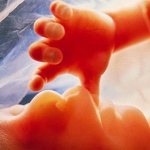Written by Kathy Clubb
In an astounding reversal, a proposed law that would have forced Catholic hospitals to provide abortions was rejected by Victoria’s Upper House this week. Put forward by Fiona Patten of the Reason Party, the Health Legislation (Conscientious Objection) bill was designed to make Catholic and other denominational public hospitals provide abortions, contraception and assisted suicide in violation of their ethos.
A Statement of Compatibility, prepared by Fiona Patten herself, un-ironically claimed that there are no human rights incompatibilities contained within her bill. It states that her proposed bill “does not limit any human right to freedom of thought, conscience, religion or belief” while glossing over the egregious human rights violation at the heart of every abortion; the intentional death of a tiny human being. Additionally, the bill contains other human rights violations, since there is no mention of protections for non-registered health workers such as administration staff and cleaners. Those workers could then find themselves in the position where they would be forced to resign rather than be complicit in an abortion or assisted suicide.
Although the bill purported to protect the rights of individual medical staff to object to involvement in the problematic procedures, it was not clear how a hospital would be able to provide those services without staff who are willing to perform them. While it is reasonable to think that some hospital staff have no qualms about performing abortion or assisting at a patient’s suicide, it is not beyond the bounds of imagination to think that there may be hospitals where there is not one member of the staff who will. This leaves two possibilities: either staff would eventually be coerced into providing those services, or else a hospital would need to engage the services of a complete suite of anti-life doctors, nurses and support staff when anti-life procedures were scheduled.
More likely than a Catholic hospital agreeing to employ outside staff in order to fulfil the onerous demands of the bill however, is the possibility that such hospitals would close their doors for good. This would normally be unthinkable during a time of state-wide bed and staff shortages, but would have left some denominational hospitals with little choice, had the bill been successful.
When Fiona Patten first put forward her bill, it appeared as though everything would go her way. There was little doubt at that stage that the ALP would support her bill in exchange for the support shown by the Reason Party for the extension of the Premier’s draconian Pandemic Powers bill last year. Things went downhill after that however, as it soon became clear that the Andrews government would not be supporting the bill.
While it would be quite miraculous to think that Daniel Andrews and his cohort of Emily’s List MPs had experienced a change of heart regarding abortion, their decision not to support the bill was purely pragmatic. Victoria’s Health Minister, Mary-Ann Thomas, was clear about the real reason behind its rejection of the bill. She told the media that “We are not in the business of cutting funding to public health services in Victoria – indeed the absolute opposite.”
Victoria is still feeling the effects of last year’s $93 million budget cut, when the then Morrison government backtracked on its promised hospital funding. With an election around the corner, it seems that even “Teflon Dan” is wary of upsetting voters by increasing pressure on a health system that is already teetering on the edge of collapse.
From the start, this bill was specifically an attack on the Catholic Church, something Patten made no attempt to hide. This can be seen in the way the Catholic Church was singled out as a prime example of the government-funded, denominational public hospitals she wants to see providing abortions. The page for her campaign, which encouraged voters to email their politicians in support of her bill, singled out the Catholic Church as the worst offender, saying “the public health system should not be limited by the views of a particular religion.” In her second reading speech, Patten cited the 1988 Health Service Act, again identifying the problem as being “of Catholic origin.”
Fiona Patten’s mouthpieces repeated the bigotry, claiming that the Church’s influence was behind opposition to the bill. On the day of the vote, Michael Short, media advisor to the Reason Party, asked “Will they [the Andrews government] have the courage of their convictions, or will the power of the Catholic Church trump principle with an election around the corner?”
What Patten refers to as “religious ideology in the public health system” is nothing other than a case of medical practitioners choosing to abide by their own well-formed consciences. As Archbishop Anthony Fisher of Sydney said, Fiona Patten’s ideology creates a climate wherein “doctors are considered manufacturers or retailers or civil servants and where patient preference is the primary factor in decision-making.”
“Such a conception of medicine risks devolving into a mechanistic practice, where doctor and patient are opposite sides of a transactional exchange, where decisions are made only by recourse to official guidelines however constructed, and where protocols and procedures trump personhood and thinking humanely.”
Promoters of the bill have continually referred to the millions given in funding to denominational hospitals by the state government, suggesting that it is only fair that in return, doctors be allowed to kill Victorian citizens at those locations. What the pro-death commentators consistently fail to mention is that denominational hospitals return a portion of that funding to the government in the form of GST, whereas government hospitals are exempt. That amount is not insignificant: for the 2021-22 financial year, Mercy Hospitals and St. Vincent’s paid more than AUS $7.7 million and 2.4 million in GST respectively whereas the Royal Women’s and the Alfred paid none. While GST is paid to the federal government, a portion is returned to the states, proving that denominational hospitals are contributing financially to Victoria’s well-being.
Fiona Patten is by no means finished with her attempt to expand abortion access in Victoria. Speaking to The Age, Patten said that if she is re-elected after November’s election, she will push forward with a complete abortion reform package. This would include re-tabling her failed hospital bill, along with other legislation which aims to increase access to medical abortions and which will assist women in regional areas to abort their babies without hindrance.
Patten also wants to ensure that assisted suicide becomes easier to access, adding to her already successful anti-life initiatives such as the introduction of heroin injecting rooms and “safe-access” zones around abortion businesses.
Fiona Patten has also launched a scare campaign targeting pro-life candidates running in November’s election, whom she refers to as “religious conservatives,” in the hopes that she can convince voters not to support them. What people of Fiona Patten’s ilk fail to understand is that pro-life, conservative politicians, are simply decent human beings. They believe that killing the innocent fails to solve any problems, and that it actually creates many more problems for individuals and for society. This is hardly an extremist position!
The outcome in this case was a welcome one, but the need to educate society on the value of human life has never been more urgent. It is to be hoped that any future attempts to remove the right to conscientious objection by both individuals and institutions will be met with a similar defeat.










